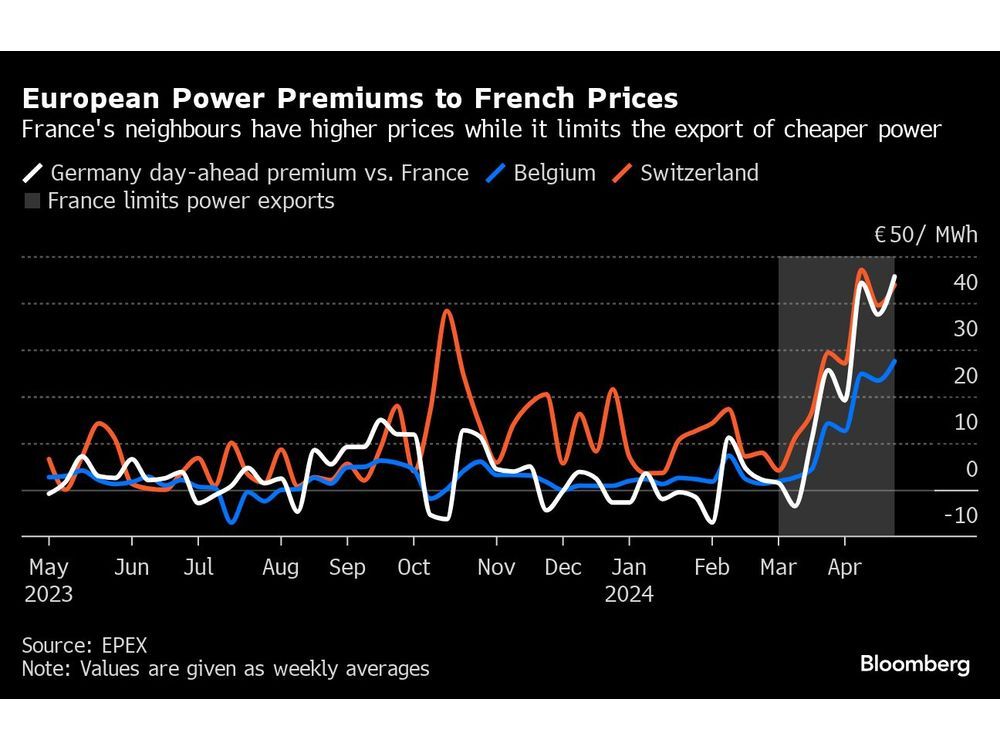Grid limitations in parts of France are constraining power exports, pushing up prices in neighboring countries.
Author of the article:
Bloomberg News
Eamon Akil Farhat
Published Apr 24, 2024 • 2 minute read
(Bloomberg) — Grid limitations in parts of France are constraining power exports, pushing up prices in neighboring countries.
The capacity for transmitting electricity to Belgium, Germany, Switzerland and Italy has been reduced since early March, according to French power-grid operator RTE. That’s depriving those nations of exports of cheaper French nuclear power and boosting wholesale prices across the region. The constraints should be resolved by early May, according to RTE, but more curbs are likely from mid-August.
THIS CONTENT IS RESERVED FOR SUBSCRIBERS ONLY
Subscribe now to read the latest news in your city and across Canada.
- Exclusive articles from Barbara Shecter, Joe O’Connor, Gabriel Friedman, Victoria Wells and others.
- Daily content from Financial Times, the world’s leading global business publication.
- Unlimited online access to read articles from Financial Post, National Post and 15 news sites across Canada with one account.
- National Post ePaper, an electronic replica of the print edition to view on any device, share and comment on.
- Daily puzzles, including the New York Times Crossword.
SUBSCRIBE TO UNLOCK MORE ARTICLES
Subscribe now to read the latest news in your city and across Canada.
- Exclusive articles from Barbara Shecter, Joe O’Connor, Gabriel Friedman, Victoria Wells and others.
- Daily content from Financial Times, the world’s leading global business publication.
- Unlimited online access to read articles from Financial Post, National Post and 15 news sites across Canada with one account.
- National Post ePaper, an electronic replica of the print edition to view on any device, share and comment on.
- Daily puzzles, including the New York Times Crossword.
REGISTER / SIGN IN TO UNLOCK MORE ARTICLES
Create an account or sign in to continue with your reading experience.
- Access articles from across Canada with one account.
- Share your thoughts and join the conversation in the comments.
- Enjoy additional articles per month.
- Get email updates from your favourite authors.
Sign In or Create an Account
or
Article content
Article content
More intermittent renewable generation means European nations rely on each other not only for supply when their own wind farms or solar fields aren’t producing, but also to provide a market to absorb any excess power. Grid constraints are creating a need to curtail power generation at times — forcing wind farms to be turned off — and huge investment is needed to upgrade the infrastructure as more capacity comes online.
The situation in France in recent weeks raises some important questions for Europe’s transmission system, according to Daniel Muir, an analyst at S&P Global Commodity Insights.
“Whether this is a short-term problem simply relating to internal maintenance, or if this is a more persistent issue that could reoccur in the future?” Muir said.
Should it become an issue in August, it could have repercussions for the Italian power market, which relies on France for consistent cheap power during hot summer nights when cooling demand picks up but solar or wind are not available. Without those supplies, more expensive gas-fired generators will have to fill the gap.
Too much power supply in one market can be difficult to balance too. European markets are struggling with lower demand since the energy crisis despite lower prices. This means supplies can overwhelm the network when it’s particularly sunny or windy, sometimes triggering negative prices.
So far this month, German day ahead power is on average €40 more expensive than in France.
French month-ahead power fell 0.544% to €25.62 per megawatt-hour by 8:16 a.m. in Paris. In Germany, the equivalent contract rose 1.03% to €62.82 per megawatt-hour.
—With assistance from Francois de Beaupuy.
Article content
